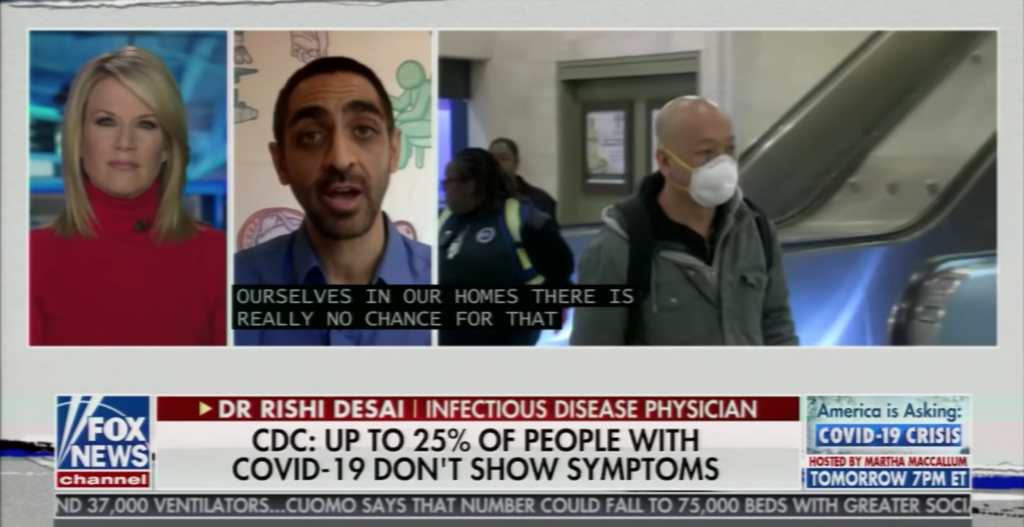
It’s been an interesting week for Dr. Rishi Desai, a pediatric infectious diseases physician and chief medical officer at digital med-ed platform Osmosis. Last Wednesday night, he appeared on Fox News to discuss the Trump administration’s response to the COVID-19 crisis, comparing efforts by the United States and South Korea to stem the virus’ spread. “Their population is one-sixth of ours. Look at the cases they have. Look at the mortality they have. It’s a trifle compared to what we’re dealing with right now because we’ve had a very weak response and they had a really strong response,” he said. Following Desai’s appraisal, anchor Martha MacCallum paused for a beat before tersely thanking him and ending the segment.
The clip went viral, in ways both expected and unexpected, and Desai found himself a newly minted media star. His daily COVID-19 video briefing started posting to Osmosis’ YouTube channel on Thursday; he joined Twitter shortly thereafter and, by Friday afternoon, had accumulated more than 55,000 followers. To cap off the surreal 48-hour stretch, he appeared on Anderson Cooper’s CNN broadcast on Friday night. For what it’s worth, he said he’d welcome another invitation to appear on Fox News.
Go-to source for all things coronavirus is a role Desai couldn’t be more professionally qualified to fill. Per his Osmosis bio, he graduated from UCLA at age 18 with a Bachelor’s degree in microbiology and molecular genetics. After completing his medical training, he worked at Boston’s Children’s Hospital and Stanford University before returning to UCLA and receiving a Master of Public Health degree in epidemiology. Later, he spent two years at the Centers For Disease Control and Prevention as a viral disease outbreak investigator.
Holed up with his wife and young son in the Bay Area (“honestly, it’s been a blessing,” he said), Desai has sought to contextualize COVID-related information for viewers who might be overwhelmed by the sheer magnitude of it all. That means plenty of infographics and videos, rather than dense blocks of text or web-ready explainers.
Desai stresses that the coronavirus story remains extremely fluid, which places an added burden on health media personalities and outlets to continuously revisit their coverage. “Medicine is not static. The things I learned in med school are not the same as the things I do in practice today,” he said. “We’re promising to update our information and we’re staying in touch with the reality of the situation. We’re not going to let [dated information] stagnate.”
That thinking has defined Osmosis’ educational push around the crisis. The company hasn’t gone all-COVID-all-the-time – the medical universities and nursing schools with which it partners continue to rely on Osmosis’ broader-based materials – but it jumped into the fray early on with #FlattenTheCurve and #RaiseTheLine. The effort was designed to inform any/all audiences about ways to slow down the spread of coronavirus and the keen need to increase the capacity of the U.S. healthcare system.
“You have to realize that our hospitals were working at full capacity before COVID-19 came along,” Desai explained. “Now, as that capacity is being stretched, we’re canceling elective procedures and pulling retirees back to work and changing the rules so that new graduates can work. #RaiseTheLine is a galvanizing phrase for that, but also for so much more that we need to do.”
Is it working? Desai said he sees “more and more traction” every day, but believes the healthcare system has a ways to go before it catches up and accumulates the resources it needs to manage the flood of COVID patients. “Healthcare workers have been raising alarms about this for some time now. We’re going to have to recognize that this is not a nice-to-have, it’s a must-have,” Desai noted.
At the same time, he has his eyes trained on what comes next. “I don’t think I’ve ever felt as inspired and optimistic about our country as I do these days,” Desai continued. “My three-year-old son is talking to me about social distancing. My mother, who’s not scientifically inclined, is talking about proper hand-washing. All these learnings will pay huge dividends down the road – not just during pandemics, but during other health crises.”






